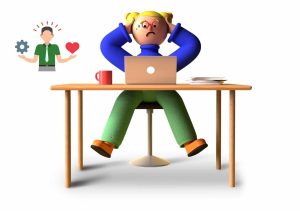Stress Management
Although it might seem as if there’s nothing you can do to ease stress at home and at work There are ways to ease the stress and get back in control.
Stress management is crucial to manage
If you’re dealing with excessive concentrations of stress you’re placing your whole health at risk. Stress is a snare to your emotional health and your physical well-being. It reduces your capacity to focus, think clearly, work efficiently, and live life to the fullest. There’s no way to alleviate stress. The bills will continue to pile up and there’ll be no longer hours to work, while your job and family obligations will always be demanding. But you’ve got more control over your life than you believe.

A well-managed stress reduction program can help to break the grip that of stress on your life, which means you’ll feel more healthy, happier as well as more efficient. The ultimate goal is to have a healthy lifestyle that allows the time to work, family enjoyment, relaxation, and the strength to stand to pressure and face the challenges head-on. However, managing stress isn’t an exact fit for everyone. This is why it’s crucial to test and discover the best method for you. These tips for managing stress can assist you in this.
Tip 1: Determine the causes of stress in your life.
The first step to managing stress is to identify the stress-producing factors in your daily life. It’s not as easy as it may sound. Although it’s simple to recognize significant stressors like changing jobs, moving as well as going through a divorce identifying the causes of chronic stress is more challenging. It’s not difficult to forget how your personal beliefs, emotions and behavior influence your daily stress levels.
It’s likely that you’re always worried about your deadlines for work But maybe it’s your procrastination rather than the actual demands of your job which is creating the stress.
To pinpoint the root cause of stress, you must look closely at your actions, attitudes and excuses
- Do you dismiss your stress as being only temporary (“I just have many things happening at the moment”) even although you’re unable to remember when you last had a break?
- Do you consider stress to be an integral component of your personal or professional life (“Things happen constantly there”) and as aspect of your character (“I have lots of energy and nervousness and that’s it”)?
- You blame stress and anxiety for people or events outside of your control or consider it completely normal and not unusual?
As long as you do not take responsibility for the part you have in creating or maintaining your anxiety level will remain beyond your control.
Start a stress journal
An exercise in stress can assist you to recognize the stressors that are common to your life, and how you manage these. Every time you are stressed take note of the stress in your journal or make use of a stress tracker for your smartphone. A daily journal can help you identify the patterns in your life and identify common threads. Write down:
- What was the cause of your stress? (make an educated guess if uncertain).
- How you felt both physically as well as emotionally.
- How you responded.
- What have you done to help you feel better.
Tip 2: Learn the 4 A’s of stress-management
Stress is a normal response from the nervous system there are some stressful events occur at predictable moments like your commute to work or a conference with your manager or gatherings with your family like this. In dealing with such stressors that are predictable you have the option of changing the circumstances or alter your reactions. In deciding which one to pick in any situation, it’s useful to consider those four letters: Avoid change, adapt, or accept.

The four A’s: Beware, Alter, Adapt & Accept
Beware of stress that is not needed.
It’s not a good idea to avoid stress that requires attention You may be pleasantly surprised by the amount of stressful situations in your life can be eliminated.
Learn to be able to say “no.“ Know your limits and be sure to stick to the rules. Be it in your professional or personal life taking on more than you are capable of handling is a sure-fire way to create stress. Separate those who “shoulds” and the “musts” and, if you can you can tell yourself “no” to taking on too many things.
Beware of people who cause stress. If you find someone who consistently causes anxiety in you, cut down the your time with the person or terminate the relationship.
Control your surroundings. If the news at night causes you to be anxious, switch off the television. If the traffic is making you anxious consider taking a slower but less traveled route. If shopping at the market is a hassle make your shopping on the internet.
Make a list of your tasks. Review your schedule tasks, responsibilities, and the daily chores. If you’re overwhelmed with tasks to handle, move those tasks that aren’t essential at the bottom of the list or completely eliminate them.
Change the situation
If you are unable to avoid an unpleasant situation, attempt to make it less stressful. Most of the time, this means altering the way you interact and function in your everyday life.
Be open about your feelings instead of burying them. If someone or something is irritating you, you should take a more direct approach and share your concerns in a candid and respectful manner. If you have an exam to take and your chummy roommate arrived home from work, make it clear upfront that you only have five minutes for discussion. If you don’t express your feelings, anger will rise and anxiety will rise.
Accept accept compromise. If you want someone to change their behaviour then be prepared to do the same. If you’re both willing to bend slightly, you’ll have a the chance to find an acceptable middle ground.
Make sure you have a balanced schedule. A life of work that is not balanced is a recipe for exhaustion. Find the balance between family and work social and leisure activities, daily obligations and leisure time.
Adjust to the tension
If you are unable to change the source of stress, make changes to yourself. You can learn to adapt to stressful situations and restore the sense of control you have by altering your mindset and expectations.
Reframe issues. Try to look at difficult situations from a positive angle. Instead of ranting over a jammed-up traffic take it as an opportunity to slow down and regroup. You can also listen to your favorite radio station or simply relax.
See the bigger view. Be aware of the stress situation. Consider how significant it is over the long term. What will it mean in the course of a month? In a year? Does it really matter to be angry about? If not then you should focus your attention and effort elsewhere.
Set your own standards. Perfectionists are the main cause of stress that is not worth it. Don’t set yourself to fail by demanding perfection. Set realistic standards for yourself and for others and be content by being “good enough. “
Practice gratitude. If stress is bringing you down and you are feeling overwhelmed, take the time to think about everything you value throughout your day, which includes your positive traits and talents. This simple method can help keep things in the right perspective.
Accept the things that you cannot change.
Stress can be caused by many things that are inevitable. It is impossible to prevent or alter circumstances like the death of a family member, an illness that is serious or a recession that affects the entire country. In these situations the best approach to deal with anxiety is accepting the situation just the way that they have been. Acceptance can be difficult but in the end it’s less difficult than fighting against something you can’t alter.
Do not try to control something that is uncontrollable. A lot of things in life cannot be controlled and that includes the behavior of others. Instead of focusing on these things, concentrate on things you manage, like the way you react to situations.
Seek the upside. If you are faced with major challenges take the time to view these as an opportunity to develop your personal skills. If your decisions led to a stressful circumstance, think about them and take lessons by observing your own mistakes.
Be able to forgive. Accept of living in a imperfect world, and that humans make mistakes. Release anger and regrets. Get rid of the negative energy by accepting forgiveness and moving forward.
Feel free to share your thoughts. Being honest about what’s going on can be very therapeutic even if there’s nothing you can do to change the situation. Chat with an experienced friend or set the appointment to see a counselor.
Tip 3. Move!
When you’re stressed-out, the last thing you want to do is get up and moving. However, physical exercise is an incredible stress reliever. You don’t need necessarily be an expert athlete nor spend long hours in a fitness center to enjoy the benefits. Exercise produces endorphins and makes you feel great as well as be a great distracting factor from the stresses of life.
If you’ll reap the greatest benefits from regular exercise for at least 30 minutes it’s acceptable to increase your fitness level slowly. Even the smallest of activities could be a lot of fun in the course of a single day. First, you need getting yourself moving. Here are some simple ways to include exercises into your day-to-day routine:
- Turn on the music and get moving.
- Go to the park for a walk.
- Bicycle or walk to the store.
- Utilize the stairs at the office or home instead of an elevator.
- Parking your vehicle in the furthest location in the parking lot, then walk to the other side.
- Begin by joining forces with an exercise partner and support one another as you work out.
- Play Ping-pong or a video-based activity game with your children.
The stress-busting power of mindful exercising in a rhythm
Though any type of exercise can relieve stress and tension and stress, rhythmic exercises are the most efficient. Some good options include running, walking and cycling, dancing, swimming or tai-chi aerobics. However, whatever you pick ensure it’s something that you like and you’ll be more likely to stay with it.
When you exercise take the time to observe your body as well as any sensations that you feel. (and often emotional) sensations that you feel while you move. Try to coordinate your breathing and moves, for example or observe how sunlight or air feels your skin. This mindfulness component can assist you in breaking out of the negative cycle that are often associated with stress.

4. Connect with other people
There’s nothing more relaxing than spending time with a person who makes you feel secure and respected. Face-to-face contact can trigger a chain reaction of hormones that counteract the body’s defense “fight-or-flight” response. It’s the natural stress-relief mechanism (as an added benefit is that it helps to fight anxiety and depression). Make it a priority to keep in touch regularly, in person, with your loved ones and family.
Be aware that the people you meet do not have to be able to alleviate your anxiety. They only have to be excellent listeners. Don’t be afraid of appearing thin or being burdensome hinder you from speaking up. People who value you will be elated by your confidence. This can only strengthen your bonds.
It’s always practical to have someone near by to rely on when you’re overwhelmed by anxiety, but by creating and maintaining a circle of friends, you will boost your resilience to the world’s stresses.
Tips to build relationships
- Speak to a friend at work.
- Help others by giving your time.
- Take a break for lunch or coffee with a pal.
- Have a family member keep track of you on a regular basis.
- Take someone with you to the cinema or a show.
- Contact or email an old acquaintance.
- Take a stroll with a fitness buddy.
- Plan a weekly dinner date.
- Find new friends by attending an online class or joining a group.
- Credibility in a clergy member or teacher coach.
Tip 5: Set aside time to have fun and relax
Beyond a positive attitude and a positive outlook You can lessen stress by making time for “me” time. Don’t get involved in the rush and bustle of life that you neglect to attend to your personal requirements. It’s a must to take care of yourself not a luxury. If you take time to enjoy yourself and relaxing, you’ll be at better position to manage the stress of life.
Set aside leisure time. Make time for relaxation and rest in your routine. Do not let other obligations overtake your time. It’s your chance to get away from all obligations to recharge the batteries.
Enjoy something you do each day. Find time to do things that give you pleasure regardless of whether you are watching the stars or playing the piano or riding your bicycle.
Maintain your sense of laughter. This means you can smile at yourself. The act of laughing can help your body to fight stress in many ways.
Try a yoga or meditation practice. Techniques for relaxation like yoga meditation, meditation, and deep breathing trigger the body’s relaxation reaction, an euphoria that counteracts fighting or flee response. When you master and practice these methods and techniques, your stress levels will lower and your body and mind will be more calm and focused.
Tip 6: Manage your time better
Ineffective time management can lead to lots of stress. If you’re stretched thin and rushing you’re unable to stay at peace and focused. You’ll also be tempted by the urge to stay away from or reduce those healthy activities you need to be doing to reduce stress including socializing, and getting enough rest. The good newsis that there are some things you can do to improve your life-work balance.
Don’t over-commit yourself. Do not schedule things in succession or trying to squeeze too much in one day. We often underestimate how long the process will take.
Prioritize tasks. Write down the things you need to complete and complete them in order in order of importance. Prioritize the tasks that are most important. If you’ve got something difficult or stressful to take care of take care to finish it in the early hours. The rest of your day is likely to be more relaxing due to it.
Divide projects into small steps. If a huge project appears overwhelming, create a step-by-step plan. Make sure you focus on one small phase at a given time, instead of tackling everything in one go.
Delegate the responsibility. You don’t need to take on the entire task by on your own in your school, home or at work. If others are able to handle the job, why not let them? Don’t have the need to be in control or supervise every single step. You’ll free yourself from unnecessary stress.
Tip 7: Keep the balance by living a healthy and balanced lifestyle.
Alongside regular exercise There are many other healthy lifestyle choices that will increase the resistance you have to strain.
Eat a healthy diet. A well-nourished body is better able to deal with stress, so take note of the food you consume. Begin your day with a healthy breakfast. Keep your energy high and your mind focused by eating balanced, healthy meals throughout the day.
Reduce the amount of sugar and caffeine. The short-term “highs” caffeine and sugar offer often result in feeling depressed and lacking energy. By reducing the amount soft drinks, coffee, chocolate, and sugary food items in your diet you’ll be more relaxed and will sleep better.
Beware of smoking cigarettes, alcohol, or other drugs. Alcohol or drugs can provide a quick escape from stress, however it’s only temporary relief. Avoid or cover up the problem tackle the problem face-to-face in a calm head.
Sleep well. A good night’s sleep is essential for your brain and your body. A feeling of fatigue can cause anxiety because it can make you think out of the box.
Tips 8: Learn how to let stress go in the present moment.
If you’re exhausted by the morning commute, in the middle of a work meeting that is stressful or exhausted from an dispute with your spouse you’ll need to find a way to control your stress levels today. That’s where fast stress relief can be found.
The most effective way to decrease stress is to take an inhalation and using your senses — what you feel, see or taste through a gentle motion. When you look at a photo of your favorite or smelling a particular fragrance or listening to a favorite track, chewing gum or embracing a pet as an example, you will be able to easily relax and concentrate.
Naturally that not everyone reacts to every sensory experience exactly the same manner. The most effective method for quick relief from stress is to try different experiences and find the distinctive sensory experiences that work for you.
The article you may like )
Nutritional Needs For Older Adults

